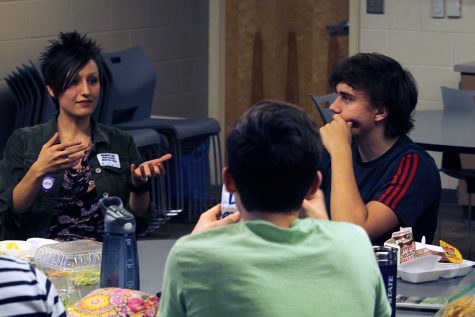New Science Cafe introduces scientific discussion, student participation
October 29, 2018
The deafening sounds of Manhattan High students could just barely be heard in the Alumni Room of West Campus last Tuesday. As the small room strained to block out the roars of lunch period outside the barriers of the tan cinder block walls, about 10 students — all juniors — surrounded a small table littered with various lunchtime meals, craning to listen to a small woman seated in the middle. Behind her, a PowerPoint presenting the psychology of video game play stood paused and at attention for the inaugural Teen Science Cafe event, hosted by Sunset Zoo’s Behind the Science program and Science Communication Fellowship, with help from Biology teacher Noah Bush and Environmental Science teacher Clancey Livingston.
“It’s important for high school students looking for higher education to get a realistic idea about what it’s like to be a graduate student,” Livingston said. “With [Science Cafe], we get both the scientific and human aspect of the experience.”

Sunset Zoo Science Communications Fellow Lisa Vangsness talks about her profession and research as junior Alex Andresen listens. Students had the opportunity at lunch to come together and listen to Vangsness through the Teen Science Cafe series.
According to their Twitter, Behind the Science is “an initiative to take the public behind the scenes of scientific research.” This is often done through their science communications training program for graduate students by using Behind the Science events as practice in engaging a public audience.
While it typically hosts events for adults, such as Science on Tap, or family events like Science Saturdays, according to director Jared Bixby, the group has been looking for a way to reach out specifically to the high school audience for some time now and are quite enthusiastic about the introduction of Science Cafes here at MHS.
“The thing [program directors] keep hearing is ‘we want to inspire younger generations and future scientists’ and high school is a great way to do that,” Bixby said. “Working with [Livingston] and [Teen Science Cafe] will allow both grad students in our program and high school students to be exposed to something new.”
Similar words were expressed by Science Cafe’s first speaker ever, Lisa Vangsness, medical student, Ph.D. candidate at Kansas State University and Sunset Zoo Science Communication Fellow. According to the Teen Science Cafe flyers, Vangsness was invited to speak to students about her research regarding human beliefs about difficulty, and how they affect our ability to complete tasks, as well as how she studies these through visual research, academic procrastination and video game play.
“There are a lot of different areas of science and high school does a good job preparing us for those but doesn’t actually address necessarily the specific fields,” Vangsness said. “[Science Cafe is] a way to get people exposed to the different areas of science and help them understand not every aspect of science is just a bunch of calculations.”
She went on to encourage all students to participate in the experience regardless of their postsecondary goals.
“I want to point out that not every person goes to college,” Vangsness said. “Some go and others go to tech school, or some don’t go at all and that’s okay. This is just another point of interest, a way to get exposed to something else.”
Again, exposure to the various aspects of science seemed to be a recurring theme of the event, as stated by attendees.
“I want to go into the medical field and even though [psychology] isn’t the specific career I want to study, it applies to many different career paths you can take,” Liz Efken, junior, said.
The next Science Cafe will be hosted next Tuesday in the Alumni room during first and second lunch. According to Bixby, they may relaunch the series in the winter and spring depending on the success of these first few events.

